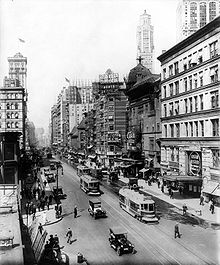Maxine Elliott's Theatre
| WOR Mutual Radio studio CBS Radio Playhouse No. 5 CBS Television Studio No. 51 |
|

Broadway north from 38th St., New York City, showing the Casino and Knickerbocker Theatres, a sign pointing to Maxine Elliott's Theatre, which is out of view on 39th Street, and a sign advertising the Winter Garden Theatre, which is out of view on 50th Street. All but the Winter Garden are demolished. The old Metropolitan Opera House and the old Times Tower are visible on the left.
|
|
| Address | 109 West 39th Street Manhattan, New York City United States |
|---|---|
| Coordinates | 40°45′12.06″N 73°59′9.46″W / 40.7533500°N 73.9859611°WCoordinates: 40°45′12.06″N 73°59′9.46″W / 40.7533500°N 73.9859611°W |
| Owner | The Shubert Organization (1908-1956) |
| Type | Broadway |
| Capacity | 935 |
| Construction | |
| Opened | 1908 |
| Demolished | 1960 |
| Architect | Marshall and Fox |
The Maxine Elliott Theatre was a Broadway theater located at 109 West 39th Street in Manhattan. Built in 1908, it was demolished in 1960. The theater was designed by architect Benjamin Marshall of the Chicago firm Marshall and Fox.
It was named for U.S. actress Maxine Elliott, who originally owned a 50 percent interest in it in partnership with The Shubert Organization, making her one of the only female theater managers. She leased it to the Federal Theatre in 1936; the following year, it was shut down by the government on the eve on the opening of Orson Welles's production of The Cradle Will Rock.
In 1941, it became a radio studio and in 1948, it again transformed into a television studio, where the very first episodes of Ed Sullivan's Toast of the Town variety show were broadcast from. In 1956, Elliott's heirs sold her share to the Shuberts, who then sold the property. It was demolished in 1960. The theatre, built in a thriving theatre district, was the only Broadway house below 41st Street.
The Maxine Elliot housed approximately 935 patrons. Throughout its lifetime, the Maxine Elliot housed a multitude of plays, including original works by George Bernard Shaw, John Millington Synge, Lady Augusta Gregory, Lord Dunsany, Lillian Hellman and Somerset Maugham. Only three of its productions were musicals, including one opera.
...
Wikipedia
